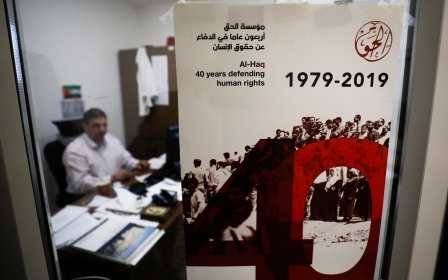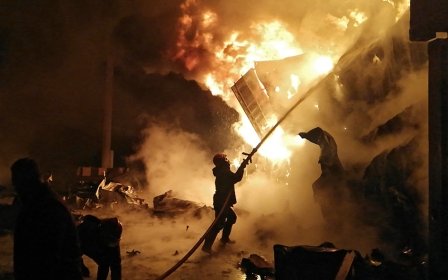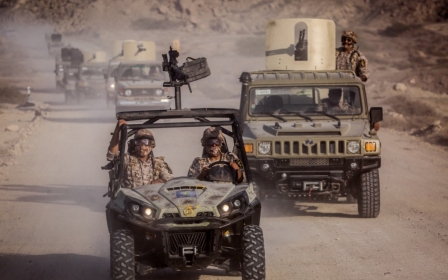The West Bank, not Iran, is Israel’s greatest threat in 2022
Despite the change of government six months ago, which released Israelis from the vociferous and inciting grip of Benjamin Netanyahu's power, 2021 seems to have been a year of more of the same, on all fronts.
The Israeli Air Force (IAF) continued to attack magazines and other targets in Syria, not only without any difficulty, but most probably with the tacit encouragement of Russian President Vladimir Putin. It is clear to Israeli, Syrian, Iranian and western observers that Putin wants Iran's presence on Syrian soil and its support for Lebanon’s Hezbollah to be discontinued.
Evidence for this can be found in Israel’s most recent strikes in Syria, which reportedly targeted Iranian sites this week in the port city of Latakia - the hub of Russian troops in Syria. Notably, Syrian air defences did not respond, which Moscow on Wednesday said was because a Russian aircraft was nearby.
A relative sense of calm is also maintained on the Israeli-Lebanese border, evidence that deterrence is working on both sides. Hezbollah, which has been weakened due to Lebanon’s political, social and economic turmoil, does not have any intentions to be dragged into a war with Israel. Meanwhile, Israel is deterred by the 140,000 Hezbollah rockets and missiles that can hit almost any point in Israel, be it a military or civilian target.
Iranian war drums
But as 2021 reaches its expiration date, Israel’s leaders and military chiefs are once again, like in a religious ritual, beating the war drums against Iran. It is intended to create the impression that the Iranian nuclear threat is the most urgent and troubling topic on the Israeli agenda this passing year.
The truth, however, is that the Israeli warmongering against Iran serves only as a decoy for two domestic purposes. One is to improve the image of the Israeli military and prove its vitality in order to demand the increase of the military’s budget. And indeed, despite the Covid -19 pandemic, which is causing many Israelis to lower their standards of living, the only sector which squeezed a budget increase from the politically fragile cabinet is the powerful security-military establishment. Its budget rose by an additional $3bn, while the services of the health, education, welfare, industry, tourism, sports and cultural fields were decreased.
The truth is that the Israeli warmongering against Iran serves only as a decoy for two domestic purposes
The second aim of Israel’s rhetorical bashing of Iran is concealing the most important challenge which is facing the Jewish state: the Palestinian issue.
On the surface, 2021 was also comparatively quiet on the West Bank and Gaza fronts. The status quo, which is reflected in the occupation, the expansion of Israeli settlements and the continued security cooperation between Israel and the Palestinian Authority, has been further cemented. What also helped to increase Israel’s feeling that it is invincible was the accelerated pace of upgrading relations with the UAE, Bahrain and Morocco. There are embassies in Tel Aviv, Abu Dhabi, Rabat, and Bahrain with open skies to tourists, enhanced economic ties and increased secret military and intelligence cooperation.
Even the May violence – which saw Israeli raids on al-Aqsa Mosque, subsequent Hamas rockets fired at Jerusalem, riots across mixed Israeli-Palestinian cities in Israel, and bombing in Gaza - subsided after a week or so and stability of a sort resumed. But recent weeks must serve as a warning to the Israeli side and as an indication of what may be the reality in the coming year.
Growing instability
There was hope that the new government, led by Naftali Bennet with a significant presence of moderate right-wingers, centrists and left-wing politicians in his cabinet, would tame ultra-nationalist Israeli settlers. But exactly the opposite is happening.
Israeli settlers in the occupied West Bank have in the last two months increasingly harassed innocent Palestinians. Olive trees were cut down and youth have been entering villages to provoke the local Palestinians. In numerous cases, their cars were damaged and people were assaulted. All of these incidents take place under the nose of Israeli security forces that turn a blind eye and allow mobs to exercise their violent attacks.
Certainly, this Israeli behaviour contributes to the rise in the number of cases in which Palestinians used firearms to attack settlers and Israel's security forces. Regardless, it is believed Hamas is behind some of these incidents, which Israel sees as an attempt to create a wedge between itself and the Palestinian Authority (PA) and halt security cooperation between the two sides.
I am neither a gambler nor a prophet, but I shall take the risk and the liberty of estimating that 2022 will neither witness a war between Iran and Israel nor between Israel and Hezbollah. There will be no full-blown war with Hamas either, except sporadic skirmishes.
The big unknown is what will happen in the West Bank. Two major developments can rock the status quo. They depend on the health of the ageing King Salman of Saudi Arabia and Palestinian President Mahmoud Abbas.
If the Saudi king, who is 85 and rarely seen in public, dies and is replaced by his crown prince, Mohammed bin Salman, it can be expected that the kingdom will go public with its relations with Israel and form official diplomatic and commercial ties, in addition to the secret military and intelligence deal already in full gear. But at the same time, unlike the UAE and Bahraini leadership, it is expected that Mohammed bin Salman will have to demand as a precondition that Israel makes concessions and advances peace talks with the Palestinian Authority.
If Abbas, 86, dies, then the PA will face a bitter power struggle, and a collective leadership, with the ambitious Mohammed Dahlan part of it, will emerge at least for some time.
Nevertheless, Israeli leaders and security chiefs know very well that the West Bank status quo is delusional.
Middle East Eye propose une couverture et une analyse indépendantes et incomparables du Moyen-Orient, de l’Afrique du Nord et d’autres régions du monde. Pour en savoir plus sur la reprise de ce contenu et les frais qui s’appliquent, veuillez remplir ce formulaire [en anglais]. Pour en savoir plus sur MEE, cliquez ici [en anglais].





